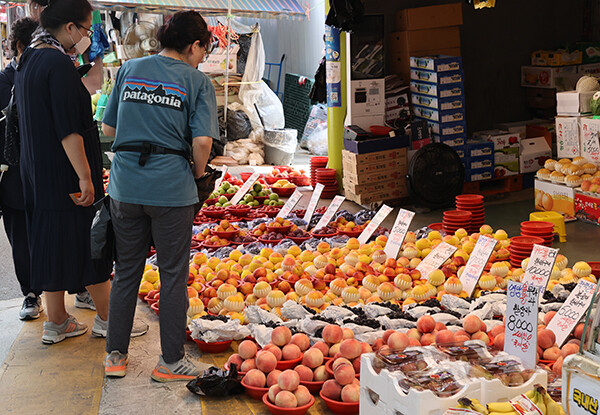
Seoul, South Korea – South Korea's consumer price inflation eased to 1.9% in May, marking a return to the 1% range after five months. This moderation offers a glimmer of hope amidst ongoing economic uncertainties, primarily driven by a significant drop in vegetable and oil prices. However, this positive trend was heavily counterbalanced by a sharp increase in livestock product prices, which registered their largest jump in nearly three years, posing a notable challenge to household budgets.
According to data released on June 4 by Statistics Korea, the Consumer Price Index (CPI) stood at 116.27 in May (2020=100), representing a 1.9% increase compared to the same period last year. This figure is a notable decrease from the 2.0% to 2.2% inflation rates observed from January to April of this year, and mirrors the 1.9% rate recorded in December of last year.
Factors Contributing to Overall Price Stabilization
The overall deceleration in inflation can be largely attributed to two key sectors: agricultural products, specifically vegetables, and petroleum products.
Agricultural product prices saw a 4.7% year-on-year decrease, with vegetable prices falling by an even more substantial 5.4%. This decline is likely due to favorable weather conditions improving harvests and increasing supply, which has helped to alleviate some of the inflationary pressures seen in previous months. For instance, the prices of frequently consumed vegetables such as kimchi ingredients (cabbage, radish) and common leafy greens have shown considerable stabilization, providing relief to consumers.
Similarly, petroleum product prices experienced a 2.3% decline, directly reflecting a significant drop in international crude oil prices, which plummeted by 24.2% compared to a year ago. This substantial decrease in global oil benchmarks has translated into lower fuel costs for transportation and energy, a crucial factor in South Korea's import-dependent economy. The decline in energy costs has a ripple effect across various industries, from manufacturing to logistics, contributing to the broader easing of inflationary pressures.
The Alarming Surge in Livestock Prices
Despite the overall calming of inflation, the livestock sector presented a stark contrast. Livestock product prices surged by 6.2%, marking the largest increase in 35 months, or since June 2022, when they rose by 9.5%. This marks the second consecutive month of sharp increases in livestock prices, putting a considerable strain on household spending.
Several key meat products saw particularly significant price hikes:
Pork prices jumped by 8.4%.
Domestic beef prices rose by 5.3%.
Imported beef prices increased by 5.4%.
Egg prices went up by 3.8%.
This rapid escalation in livestock prices can be attributed to a confluence of factors. On the supply side, there have been reports of reduced domestic production capacity due to increased feed costs, disease outbreaks (though not widespread and controlled, they can impact market sentiment and supply), and a reduction in the number of breeding animals. Higher international grain prices, particularly for corn and soybeans, directly translate to increased costs for animal feed, a major component of livestock farming expenses. This higher input cost is then passed on to consumers.
Furthermore, strong consumer demand, particularly for pork, has outpaced supply. Pork, a staple in the Korean diet, continues to be a preferred choice, and demand typically rises with warmer weather and outdoor activities. While the government has previously implemented measures such as tariff adjustments on imported meats to stabilize prices, the effectiveness of these measures appears to be limited in the face of persistent supply-side challenges and robust demand. Some analysts also point to the lingering effects of global supply chain disruptions that, while generally easing, can still impact specific agricultural commodities.
Rising Service Costs Add to Consumer Burden
Adding to the complexity of the inflation landscape, service prices rose by 2.3% year-on-year. Within this category, personal services saw a notable increase of 3.2%, contributing a significant 1.08 percentage points to the overall CPI. This indicates that while prices for goods might be moderating, the cost of labor and services continues to exert upward pressure on inflation.
Breaking down personal services further, dining-out personal services increased by 3.2%, adding 0.46 percentage points to the overall CPI, while personal services excluding dining out rose by 3.1%, contributing 0.62 percentage points. These figures highlight the rising cost of everyday services, from haircuts to leisure activities, which are often directly tied to labor costs and rental expenses. The increase in minimum wage over recent years, combined with a general increase in operating costs for service providers, is likely driving this trend.
Outlook and Policy Implications
While the headline inflation figure suggests a welcome cooling, the divergence between stabilizing goods prices and surging livestock and service costs presents a nuanced challenge for policymakers. The Bank of Korea will be closely monitoring these trends as it considers future monetary policy decisions. While the overall inflation rate is now within the central bank's target range of 2%, the persistent and sharp increases in specific food categories, particularly meat, could fuel public discontent and impact household purchasing power, especially for lower-income families.
The government may need to explore targeted interventions to address the supply-demand imbalance in the livestock sector, potentially through direct support to farmers, diversification of import sources, or further examination of domestic production efficiencies. Additionally, efforts to manage service inflation, perhaps through measures to improve productivity or address labor market dynamics, could become increasingly important to ensure overall price stability and support sustainable economic growth. The coming months will be crucial in determining whether the current disinflationary trend can broaden across all sectors of the economy, or if specific commodity pressures will continue to pose challenges.
[Copyright (c) Global Economic Times. All Rights Reserved.]




























